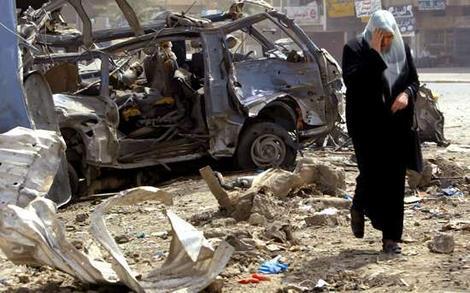Known as Mesopotamia in Antiquity, Iraq was the home to the oldest civilization in the world. Mesopotamia is the name for the area of the Tigris-Euphrates river system, corresponding in the modern day to Iraq, Kuwait, the northeastern section of Syria and southeastern Turkey and smaller parts of southwestern Iran.
Iraq was successfully ruled by the Sumerian, Akkadian, Babylonian, Assyrian, Median, Achaemenid, Seleucid, Parthian and Sassanian empires during the Iron Age and Classical Antiquity. Under the control of Parthians, Mesopotamia became a battleground between the Romans and Parthians, parts of Mesopotamia coming under Roman control. In 226 BC, it fell to the Sassanid Persians and remained under Persian rule until the 7th-century Arab Islamic conquest of the Sassanid Empire. During this period, Abbasid Caliphate, Iraq became a center of the Islamic Golden Age. After a series of invasions and conquest by the Mongols and Turks, Iraq fell under Ottoman rule in the 16th-century, intermittently falling under Iranian Safavid and Mamluk control. In War World I, Iraq came to be administered by the British Empire until the establishment of the Kingdom of Iraq in 1921. In 1958, Republic of Iraq was established.
All these fights have left traces on the Iraqi state. Each conquest brought with it a new population. They created across Iraq today, small population nuclei which they felt to be entitled to declare their independence one from the other.
Muslims were the ones who brought prosperity. They built cities and brought civilization among the tribes that were living there. The most important of all is Jaffar al-Mansour, the caliph -- Islam's spiritual leader, comparable to the pope -- who founded Baghdad between 762 and 766 -- when he construction finished. Baghdad become The Wonder.
Jaffar al-Mansour descended from the Prophet's paternal uncle, Abbas. The Abbassid caliphate lasted for five hundred years. Mansour choose the small village of Baghdad, on Tigris, as the site for his future capital because of its possibilities for transportation and agriculture. He also liked its remoteness. He wanted to get away from the factional disputes that had come up in Islam's previous capital cities of Medina, Damascus, Kufa and Basra. Islam suffered from violent factions, notably the Sunni-Shia schism, dating form soon after Muhammad's death. Mansour called his city Madinat as Salaam, "the city of peace." The name Baghdad, prevailed.
Baghdad, in the coming years, will bloom. Almost everyone knew how to read. To imagine how developed they were, remember that in the same period in Europe was The Dark Edge. They followed the Muhammad's teaching that educated men are next to the angels and that "the scholar's ink is more sacred than the blood of martyrs." Arts and sciences flourished -- literature, music, calligraphy, philosophy, mathematics, history, chemistry. The most important science was astronomy. They needed accuracy in setting the religious calendar and orienting mosques to face Mecca.
Baghdad's golden eras quickly ended. The political changes made the caliph less powerful. His domain was limited to Baghdad and nearest regions, though Sunni Muslims and in other places they still accepted his spiritual authority. The city remained a center of wealth and commerce and an imposing sight architecturally.
Soon after this interior destabilization, the Mongol invasion came. First Mongols, led by Hugalu, Genghis Khan's nephew, stopped in the mountains of Persia in order to conquer the Assassins. The Assassins were an extreme Shiite sect that terrorized neighboring rulers by sending young men on suicidal missions to kill them. The young men were drugged and were told that when they die, they would immediately go to Paradise, where women and other pleasures awaited. Hulagu battered the Assassins and then destroyed their roots and branch.
Mustasim, the caliph at that time, was a weak leader and Hulagu had no mercy. In 1258, Hulagu's forces took up a position on the eastern outskirts of Baghdad and began a bombardment. Soon they had reached the outer wall. In that moment, the caliph offered to negotiate. With the city almost at his feet, Hulagu refused. Baghdad was destroyed, Mongols killed almost everybody. All the gold, silver and the jewels was taken and many books from Baghdad's libraries were thrown into the Tigris. Hulagu tried to reconstruct the Baghdad, after he founds out that his cousin (Berke, the leader of the Golden Horde of Mongols on the steps of Russia, who had recently converted to Islam) moved to attack him. He did not accomplish much. Decades later, Baghdad will still be a ruin. Baghdad would not be a city of any consequence for another five hundred years, until its strategic location and Iraq's oil attracted the attention of world powers.
Since then the unrest, and assassinations, and street violence sporadically persisted which was hard to keep track of. Now is the same. The people of Baghdad never found their peace. They did not learn anything from their predecessors. With all those wars they will never reach the greatness of the bygone era.
Make peace, don't kill your children anymore. Educate them! Do not destroy other people lives by making terrorist attacks, take care of your own! Do not bombard your homes, schools, libraries -- build them! See your friends! Make your country, your city, your home, for real, "The City of Peace"!
